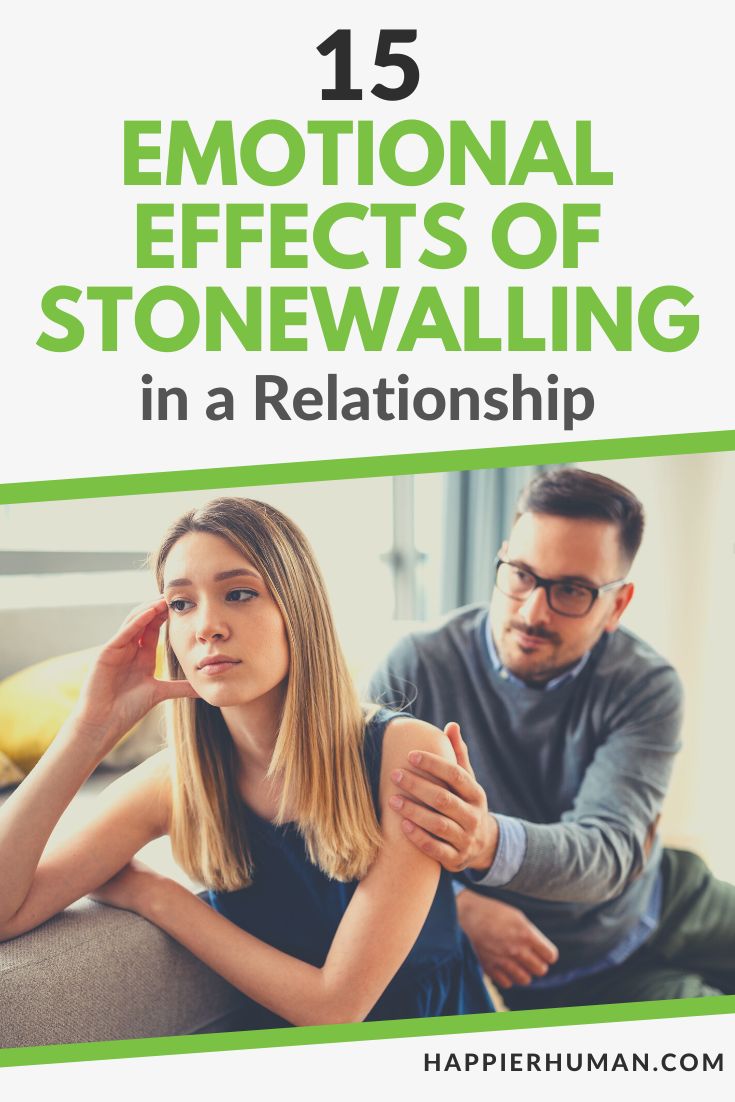You’re right to feel angry and hurt when someone you love stonewalls you… even more so if the individual is your spouse or life partner.
When I think of the word “stonewalling,” I visualize someone guarding themselves behind a strong concrete wall that I can’t penetrate. To be honest, I’m irked to the bone when someone throws up their emotional defensive walls to block me out.
What’s worse is dismissing me or shutting down in the middle of an important discussion and walking away petulantly. It’s nothing short of immature and childish. Why can’t they express themselves as grown-ups do? Instead, they run away at the slightest sign of a difference in opinions.
Going on mute and stubbornly refusing to budge instead of hashing out problems is an unhealthy coping mechanism similar to the silent treatment and is emotionally damaging in relationships.
Stonewalling is the perfect potion to slowly and silently kill a relationship. I’ll explain why people stonewall, how to tell it’s happening, and the emotional effects of stonewalling someone.
Whatever the cause of the behavioral response, know that you don’t deserve to be ignored. I’ve also included a link below to an article on ways to deal with stonewalling.
What Is Stonewalling?
Stonewalling is a refusal to speak or cooperate during a conversation or disagreement. The person completely shuts down emotionally and you’re unable to get through to them, hence the term, “stone wall.”
Suddenly withdrawing from the conversation is a common practice that often goes unnoticed if one or both partners in a romantic relationship is not aware of it.
In an article published by Banner Health, psychiatrist Dr. Srinivas Dannaram, MD, at Banner Thunderbird Medical Center, was quoted as saying, “It is a voluntary response aimed at ending a conversation or a situation that triggers emotional unrest or discomfort, resulting in an overwhelming physiologic response.”
Why Do People Stonewall in Relationships?
People may stonewall others because it is a learned defense mechanism that comes from not being able to or feeling uncomfortable expressing themselves. According to Good Therapy, the behavior is rooted in fear and frustration when conflict escalates. In some cases, it’s an attempt to self-soothe or decrease tension in an emotionally charged situation.
You may feel the person is ignoring you or pretending you’re not there. The response isn’t always intentional. In fact, there’s a scientific explanation for the response. What’s really happening is the person is so overwhelmed that their brain can’t withstand the emotions and shuts down to protect them.
The clinical term for the brain’s response is Diffuse Physiological Arousal (DPA), also called flooding. In other words, they ‘freeze‘ and zone out (flee) instead of ‘fight’ (remain engaged) once the body goes into distress.
Your partner may genuinely believe they’re doing the right thing for themselves by shutting down. However, the behavior is a form of emotional abuse if it is done intentionally to upset you or get your attention. Other reasons why people practice stonewalling include:
Signs Someone Is Stonewalling
Stonewalling is a negative communication style. It’s one of the “Four Horsemen of the Apocalypse,” that spell disaster for any relationship, according to the Gottman Institute. The concept of the Four Horsemen was first introduced in the context of relationships by Dr. John Gottamn, a psychological researcher and marital expert. The other three negative ways of communicating are criticism, contempt, and defensiveness.

According to the Gottman Institute, 85% of stonewallers are men. Perhaps it’s because men are generally conflict-adverse and some aren’t able to cope well with their and other people’s emotions. Regardless of gender, when you’re being stonewalled, the individual will do one or more of the following:
Overall, it feels like they’re giving you the silent treatment. They’ll also get mad at you once you call out the toxic behavioral pattern.
15 Psychological and Emotional Effects of Stonewalling
Let’s address the elephant in the room since your partner is refusing to communicate. Stonewalling is emotional abuse, according to BetterUp. The tactic is just as emotionally damaging as the silent treatment. Both tactics are non-effective ways of communicating in close relationships.
The main difference with silent treatment is that it’s consciously done and meant to hurt the other person. Regardless, both strategies are rude and show that the person lacks empathy or has trouble self-regulating their thoughts and emotions. If anything, refusing to engage in meaningful dialogue is largely to blame for ruining relationships and marriages.
Take a look at ways being stonewalled can affect your mental health. The effects on the other person remain the same, even if you’re the one using the tactic to cope.
Effect #1. Frustration
Since stonewalling interferes with a couple’s ability to resolve conflicts, minor disagreements could escalate out of control. As the one on the receiving end of the behavior, you may try harder to get your partner to pay attention or say something. However, your desperate attempts to spark dialogue backfire.
The more you try the more they shut down and check out mentally from what’s happening. Ultimately, you’re left feeling frustrated and may unintentionally react in a way that angers your partner or make them pull away even more.
Effect #2. Rejection
Gottman describes stonewalling as a destructive communication pattern that breaks up relationships even if the couple is in love. One reason for this happening is the rejection effect. Your partner is essentially dismissing and rejecting you if they withhold information or show no interest in open and honest communication.
Rejection stings. You may not exactly understand the purpose of the rejection, but it’s natural to conclude that they’re not taking you seriously. Faced with constant rejection, you might begin questioning your worthiness as an individual as well as your value in the relationship.
Self-soothe with 77 Rejection Quotes for When People Hurt You.
Effect #3. Confusion
Things may be going well and all of a sudden your partner withdraws into his “shell” and stops interacting. Almost anyone would feel confused by the sudden and extreme shift. Other negative emotions may also surface.
The first time I got stonewalled, I didn’t understand what was happening. I didn’t even know there was a name for the behavior. I started wondering if I was missing a clue or something. My partner stood there in utter silence. I felt blindsided and invisible.
Psychologists say stonewalling is a form of gaslighting, which is another type of emotional abuse. ‘Gaslighting’ is when someone says or does things to cause mental confusion. It sows doubt and can make you question your own reality.
After being shut out ever so often, you may start thinking something is wrong with you. With a bit of soul-searching, you realize you haven’t done anything wrong. Unable to determine the cause of their behavior leaves you feeling even more confused.
Effect #4. Anger and resentment
Usually, when one partner continuously shows a lack of interest in talking, the other partner is left feeling hurt and distressed. Not only that, when one partner persistently hinders communication, it often angers the other partner.

The more your partner stonewalls you, the angrier and more resentful you may get. Whether the motivation is to self-preserve or to hurt you, the effects do not change. The only thing that may be different is the intensity with which you feel the effects, compared to someone else. It all depends on your coping skills, resilience, and whether you have an external support system.
Effect #5. Abandonment
Shutting down communication and leaving without explanation can make you feel rejected. Depending on how your childhood experiences and how you process information, you may perceive your partner’s behavior as emotional or physical abandonment. The feeling is perfectly valid considering that stonewalling involves emotionally disconnecting from the other person, usually without providing a reason.
Being left out in the cold can be devastating. In many cases, the partner, who’s either unable to cope with the tension or intentionally refuses to communicate, also physically distances themselves. If you persist in getting answers, they’ll get even more overwhelmed by what they may perceive as clinginess in the relationship and pull away further.
Effect #6. Self-doubt
Suffering constant rejection when your partner throws up their emotional walls might make you question your own self-worth. By distancing themselves from you emotionally or physically in an attempt to stall discussions, they cause you to feel not important enough.
Concluding that your concerns don’t matter or aren’t worth addressing is both belittling and disrespectful. Perhaps you can’t help thinking that your partner doesn’t love you or care for you anymore. Self-doubt does that. It makes you feel insecure and causes you to worry whether your partner will quit the relationship.
Fear of loss of the relationship may make you try harder to get their attention. Usually, that has the opposite effect, especially if your partner has a dismissive-avoidant attachment style in relationships.
Effect #7. Emotional withdrawal
Discussing problems and exploring solutions are normal parts of relationships. Dealing with someone who consistently acts like you aren’t even in the room can be difficult. After being blocked out over and over again by your partner, you may emotionally and psychologically withdraw from the relationship.
The natural response may follow on the heels of increased frustration from being ignored, rejected, and emotionally abandoned. Emotional withdrawal is a form of self-preservation, in these circumstances, and is usually a way to cope with negative feelings.
Effect #8. Loss of interest in marital intimacy
Obstructing progress, as far as communication and resolving matters as they come up, chips away at the other person’s mental health. When you’re not feeling your best emotionally day after day, it’s natural to lose interest in sex and cuddling. You’re going to bed feeling stressed over your relationship and failure to get through to your partner.
Stress suppresses sexual urges. Men, in particular, tend to struggle with sexual intimacy when they’re in distress. In this case, they may feel pressured to listen to you and provide reassurance, even though they don’t feel like it. If you persist in getting answers when they want to sleep, they’ll feel bombarded and shut down.
Effect #9. Lowered self-esteem
Believing your partner is rejecting you can lead to a loss of confidence in who you are as a person and in your ability to connect with them. There’s an unpleasant sense of not being good enough for them.
“Why else wouldn’t he want to interact with me? It has to be me. Something is wrong with me.” Those are the question and statements I made to myself on occasions when my ex rendered himself emotionally unavailable during our marriage.
You internalize and you blame yourself for their dysfunctional coping strategy. Having this type of inner dialogue is a sign of lowered self-esteem, which is fueled by self-doubt and a loss of self-confidence.
Effect #10. Difficulty trusting your partner
Regardless of how much you love someone, it’s natural to lose trust if they regularly appear emotionally cold and detached. You’ll conclude that they are unreliable as a result of resisting communication so many times. In your mind, you can no longer trust them to be there for you or protect the relationship.

Like communication, trust is key for relationships to thrive. At first, feeling ignored or left out creates frustration, fear of relationship loss, and self-doubt. Over time, it chips away at the level of trust you have in your partner. Trust issues may add to an already troubled relationship and can lead to a breakup.
Even when your partner comes back out of their “shell,” you won’t really know how to behave. You’re not sure whether to welcome them back with open arms or tread carefully in terms of what topics to raise. You’ll feel anxious if you’re no longer able to predict their behavior and won’t know how to conduct yourself.
Effect #11. Self-isolation and loneliness
Getting stonewalled causes you to feel like you’re being punished for God knows what. If only your partner could say something, you could get a chance to ask questions and get answers. They leave you guessing and pulling your hair out, wondering what you could have done wrong.
It’s unfair to leave you with more questions than answers, when they could simply speak up and clear the air.
Isolating yourself after feeling lonely and dejected can be a way to cope and avoid the source of your frustration. At the same time, isolation has been established as a cause of loneliness and declining mental health.
Effect #12. Anxiety
Not knowing how your partner will respond may cause nervousness and anxiety whenever you have to approach them to discuss a matter. You may develop a habit of assessing her mood (hypervigilance) to decide if to say anything.
Doctors say stress, heart rate, and blood pressure levels go up when we’re constantly scanning our environment (or people) for signs of threats. Anxiety symptoms can also pop up when you’re desperately trying to resolve important issues, but your partner remains emotionally closed off.
Effect #13. Depression
Having a partner who prefers to ‘vanish’ emotionally as soon as they feel uncomfortable about a topic or situation is depressing. There are some problems you can’t effectively solve on your own. You need their input. But what do they do? They clam up and disengage.
Depression can develop from the accumulative effects of ongoing emotional distress, confusion, rejection, frustration, and feeling abandoned. Some partners may be pushed to drugs and alcohol to cope with distress, anxiety, loneliness, or depression symptoms associated with stonewalling.
Effect #14. Marital distress
Healthy communication is a foundation for happy, healthy and emotionally satisfying relationships. An ongoing habit of putting up barriers to communication and disengaging to avoid conflict resolution may eventually increase tension in the relationship and marital distress.
Marital distress occurs when there is ongoing and unresolved conflict that causes chronic dissatisfaction and reduced intimacy in the relationship. The marriage may struggle to recover if there’s a lack of change in behavior once it gets to this point. Gottman believes a breakup is looming when the relationship reaches this stage.
Effect #15. Hopelessness
Stonewalling is like cutting off the oxygen supply of the relationship. You’re unable to function properly while the other partner carries on. This is likely to make you feel powerless to correct the behavior or help your partner change, especially if you try to get her to open up and she keeps refusing.
Eventually, helpless and hopeless take over. Ultimately, this can lead to a loss of interest in the relationship, resignation, or break up.
Emotional detachment affects the entire relationship. Cathy Meyer, B.S. Biology, University of Florida, divorce coach, and founding editor of DivorcedMoms.com wrote something profound. She said, “Not only does stonewalling damage the marital relationship it is harmful to each spouse physiologically.”
No relationship is conflict-free. However, it certainly won’t hold up for long if one or both parties aren’t talking to each other. Avoiding meaningful interaction or even conflict using the stonewalling tactic is anything but an effective strategy.
If one or both partners habitually respond this way, it can put a wedge between them… reducing intimacy, interfering with healthy conflict resolution, or weakening their bond. Other risks include using drugs and alcohol to cope, anxiety, withdrawal from the relationship, loneliness, or depression.
Final Thoughts on the Emotional Effects of Stonewalling
Neglecting a partner via stonewalling tactics is a perfect recipe for driving them away. Whether intentionally or unintentionally done, the emotional effects are pretty much the same.
There may not be much you can do to help a chronic stonewaller change their approach to communication… but you can, however, take steps to protect your own mental health. It’s time to stop banging your head against a brick wall.
Ready to get started? Read up on our 11 Ways to Respond to Stonewalling and protect your mental health.


